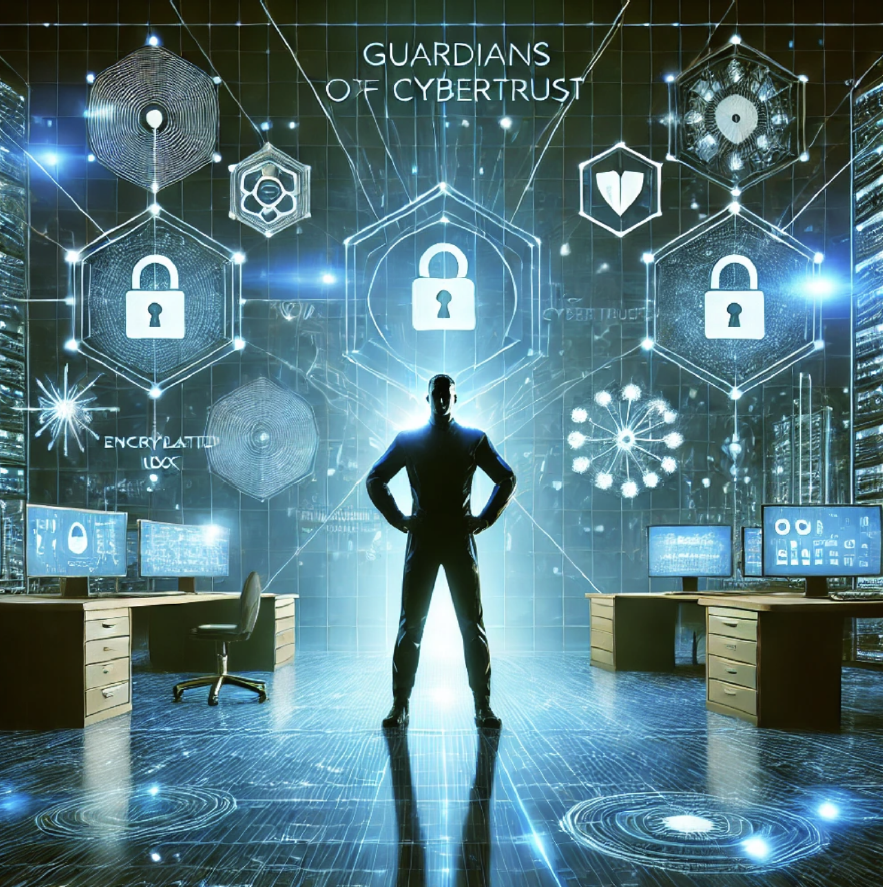The innovation ecosystem of EDIH Trakia includes hundreds of the most successful and creative companies and organizations from the civil and public sectors that are leading the digital future of Bulgaria. Today we present you an informative piece on a topical issue on the digital agenda of Bulgaria and Europe, prepared by our friends at 7 Security – a leading provider of PCI DSS audit services. If you too would like to publish in the “Innovators Speak” section, express your interest in joining our ecosystem and share your point of view on an issue important to you with the EDIH Trakia audience.
The guardians of Cybertrust: An Inside Look at the World of QSA

Imagine standing as a guard at the gates of the digital economy, entrusted with the safety of billions of transactions every day. That’s what it feels like to be a Qualified Security Assessor (QSA).
These professionals aren’t just cybersecurity experts; they’re the unsung heroes who ensure that every swipe, tap, and click in the payments world remains secure. It’s a role that is equal parts challenging and rewarding, combining technical mastery with a deep sense of purpose.
Who are QSA?
QSAs are specialists certified by the Payment Card Industry Security Standards Council (PCI SSC). Their mission? To help businesses comply with the Payment Card Industry Data Security Standard (PCI DSS), a globally recognized framework designed to protect payment card data.
Whether it’s a small boutique or a multinational corporation, QSAs dive deep into their systems, policies and procedures to ensure they meet strict security standards.
But it’s not just about ticking boxes. QSAs are also consultants, as well as system architects in some cases, guiding organizations toward stronger defenses and helping them navigate the ever-changing landscape of cybersecurity threats.
The daily thrill of QSA
If you think being a QSA is monotonous paperwork and endless checklists, think again. Every day brings a new puzzle to solve.

QSA can examine a company’s firewall configurations, track the flow of sensitive data, or advise on the deployment of encryption technologies. No two clients are the same, and neither are their challenges.
For example, a QSA might work with a retail chain that needs to secure its point-of-sale systems while integrating an inventory platform into a cloud environment. Next week, it could be a healthcare provider that wants to protect initial payment data along with patient records. This is of course where they need to consider reducing the scope and segmenting the environment, which QSA’s will help with. This variety keeps the work dynamic and intellectually stimulating.
The intersection of people and technology
At its core, the QSA role is about technology, but it is also deeply human. QSAs often find themselves bridging the gap between IT teams and executive leadership, turning complex technical requirements into actionable business strategies. This dual focus on technology and communication is where the magic happens.

For example, consider a scenario in which a QSA discovers a vulnerability in a company’s payment processing system. It’s not just about fixing the problem; it’s about training the team, fostering a culture of security and ensuring that future systems are designed with safeguards in mind. In many ways, QSAs also have an educational and advisory role, not just and evaluative one.
QSA Certification Requirements
To qualify as a QSA, candidates must meet rigorous education, certification and experience standards.
This includes the following:
Professional Certifications
Candidates must hold at least one industry-recognized certification in each of the following categories:
Category A – Information security:
● (ISC)² Certified Information Systems Security ProfessionalCISSP)
● ISACA Certified Information Security Manager (CISM)
● ISO 27001 Certified Lead Implementer (LI)
● (METI) Registered Information Security Specialist (RISS)
Category B – Audit:
● ISACA Certified Information Systems Auditor (CISA)
● GIAC Systems and Networks Auditor (GSNA)
● ISO 27001 Certified (LA)
● IRCA ISMS Auditor or higher (e.g. Auditor/Lead Auditor, Chief Auditor)
● IIA Certified Internal Auditor (CIA)
Experience Requirements
A QSA candidate’s resume must demonstrate at least one year of experience in each of the following disciplines:
● Application security: Experience identifying and mitigating vulnerabilities in web applications, APIs, or mobile applications.
● Information Systems Security: practical knowledge of applying controls to protect data, systems and networks.
● Network Security: expertise in securing network infrastructure such as firewalls, intrusion detection systems and VPNs.
● Auditing (IT Security Auditing): skills in auditing IT environments for compliance with security standards.
● Information Security Risk Assessment or Risk Management: experience in assessing risks and implementing mitigation strategies.
Key Responsibilities:
● Conduct in-depth PCI DSS assessments for organizations handling payment card data.
● Advise on the implementation of security measures to meet compliance requirements.
● Identify vulnerabilities and provide remediation strategies to improve security.
● Producing detailed reports that demonstrate PCI DSS compliance.
Exploring Emerging Technologies
One particularly exciting aspect of the QSA role is the opportunity to work with emerging technologies. QSAs often lead the way in integrating new technologies into the PCI DSS.
Why it’s important to be a QSA
The stakes couldn’t be higher. In a world where data leaks are headline news, QSAs provide a vital line of defense. Their work not only protects businesses; it protects the trust of consumers who rely on these businesses to keep their information secure.
And while the responsibility is huge, so is the reward. There is deep satisfaction in knowing that your efforts are preventing fraud, protecting sensitive data and contributing to a safer digital world. For many QSAs, this sense of purpose is what drives them through the complexities and challenges of the job.
A Bright Future
Demand for QSAs is growing as more organizations realize the importance of PCI DSS compliance. It’s a career that offers not only job security, but a chance to make a tangible difference. And with cyber threats evolving daily, the opportunities for growth, learning and innovation in this field are virtually limitless.
In conclusion
Being a QSA is about more than auditing; it’s about trust. It’s about protecting the digital economy and ensuring that both businesses and consumers can transact with confidence and integrity. It’s a career for those who love technology, thrive on challenges and want to leave a meaningful mark on the world.
If you’re someone who is passionate about cyber security, who loves to solve problems and who wants to be at the centre of the action in the fight against cybercrime, the world of QSA might just be the perfect solution. After all, who wouldn’t want to be a cyber trust watchdog?
Join the 7sec.com team
If you’re ready to take your career to the next level, check out the open QSA positions on 7sec.com. Join a dynamic team at the forefront of cybersecurity, work on cutting-edge technologies, and help organizations stay secure in an ever-changing digital environment.
Don’t wait – your next big career move starts here! Visit 7 sec LinkedIn to explore the opportunities today.
